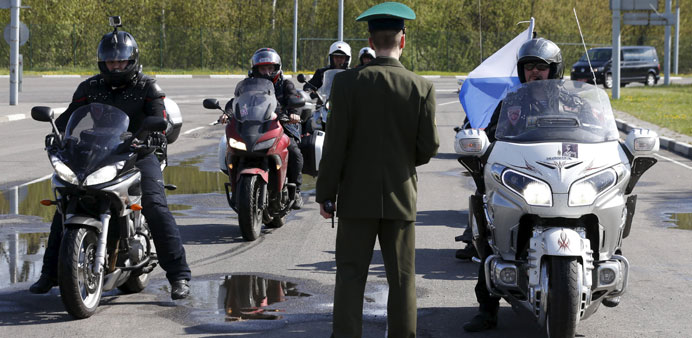A Belarussian border guard stops members of the Night Wolves motorcycle club for checks at the border crossing with Poland, near Brest.
AFP/Reuters/Warsaw
Ten pro-Kremlin bikers on a controversial ride to Berlin to celebrate Soviet victory in World War II were yesterday denied entry into Poland at the Belarusian border, Polish border guards said.
The bikers include members of the Night Wolves, a fiercely nationalist club closely linked to Russian President Vladimir Putin.
They had planned to ride 6,000km through Belarus, Poland, the Czech Republic, Slovakia, Austria and Germany before ending their trip in Berlin to celebrate the Red Army’s role in victory over Nazi Germany.
“They refused entry to Poland for all participants,” said Andrei Bobrovsky, head of the group of 10 bikers.
Polish officials carried out a three-hour search of all their belongings, Bobrovsky added.
Wearing sunglasses and black leather jacket adorned with “Road of Victory” patches, Bobrovsky said he “was added to the blacklist, had a visa annulled and was forbidden from entering the Schengen zone”.
He said the bikers’ much touted arrival at the Polish border was met with “a lot of special forces” and helicopters hovering overhead.
“It was not very nice treatment,” he said, suggesting that Europe was “scared” that their ride would lead to a growth of pro-Russian sentiments.
The bikers did not meet the necessary criteria to be allowed entry into Poland, Polish border guard spokesman Dariusz Sienicki told reporters at the Terespol border post.
He did not elaborate but said that individuals could be denied entry for lacking identification documents, a visa or a stated reason for the journey.
Bikers’ entry requests will be dealt with on a case-by-case basis, he added.
Dozens of Polish bikers, who said they were grateful to the Night Wolves for their hospitality during earlier rallies in Russia, were waiting to welcome them at the border yesterday.
“The Polish authorities’ decision is outrageous,” Polish biker Wiktor Wegrzyn told AFP, adding that the Poles would ride to Berlin in place of the Night Wolves and leave flowers at war memorials along the way.
Russian state channels closely followed the bikers’ setback at the border, some providing live coverage.
The planned rally – which had set off on Saturday from Moscow – sparked anger in Poland, a strong supporter of Ukraine’s pro-Western government and formerly under Moscow’s thumb during the Soviet era.
Polish Prime Minister Ewa Kopacz described the rally as a “provocation” and the foreign ministry last week refused entry to “an organised biker group that includes members of the Night Wolves”.
Russia’s foreign ministry said it was “indignant” and accused Warsaw of lying about the real reasons it was barring the bikers.
A German government source told AFP on Saturday that “entry has been refused to certain leaders of the Night Wolves and visas obtained on false pretenses have been annulled”.
And yesterday German officials said that border guards will try to stop the bikers from crossing the border.
Even though members of the Night Wolves may already have visas for Germany, they will be revoked at the border if members of the group, blacklisted in the United States for their participation in Russia’s annexation of Crimea, try to enter.
“The border guards are aware that there might be people with visas that are valid but have actually been annulled,” said foreign ministry spokesman Martin Schaefer. “There is a legal administrative procedure in which visas already issued can be annulled so it would be possible to deny entry to people who are carrying visas.”
The foreign ministry spokesman said Germany generally backs demonstrations and freedom of speech.
The country will be marking the end of World War II, which it considers a liberation from the Nazis, with memorials.
But the spectre of the Night Wolves taking part in a motorcycle parade through the middle of Berlin on May 9, is not acceptable, Schaefer said.
“There’s nothing illegal about it by itself,” he said. “We deeply treasure freedom of speech and freedom of assembly in Germany. But we’ve decided that some of the leaders in the Night Wolves are not pursuing legitimate aims with these plans.”
Schaefer said the Night Wolves’ support for Russia’s annexation of the Crimea last year “was proof of that”.
Members of the Night Wolves rode down en masse to Ukraine’s Crimea peninsula just after it was annexed by Russia in March 2014 and members have also fought with pro-Russian separatists in eastern Ukraine.
The Russian bikers insist the rally was not politically motivated.
The main goal was to pay respects to those killed on WWII battlefields, rally organisers said ahead of the ride.
The biker group started up in 1989 just before the fall of the USSR and has around 5,000 members across the former Soviet Union.

